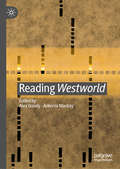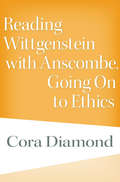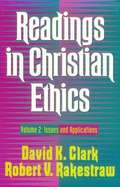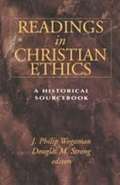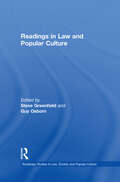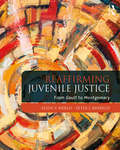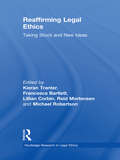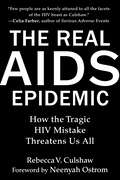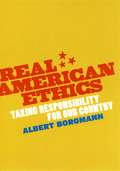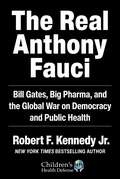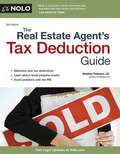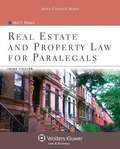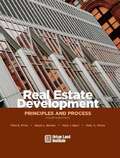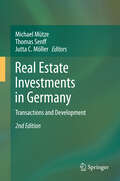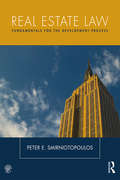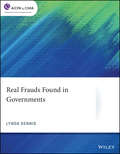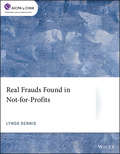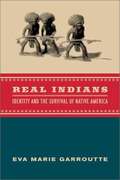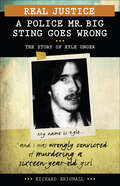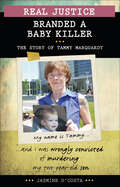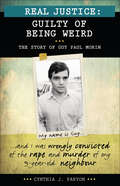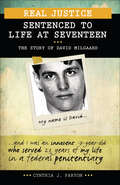- Table View
- List View
Reading Westworld
by Alex Goody Antonia MackayReading Westworld is the first volume to explore the cultural, textual and theoretical significance of the hugely successful HBO TV series Westworld. The essays engage in a series of original enquiries into the central themes of the series including conceptions of the human and posthuman, American history, gaming, memory, surveillance, AI, feminism, imperialism, free will and contemporary capitalism. In its varied critical engagements with the genre, narratives and contexts of Westworld, this volume explores the show’s wider and deeper meanings and the questions it poses, as well considering how Westworld reflects on the ethical implications of artificial life and technological innovation for our own futurity. With critical essays that draw on the interdisciplinary strengths and productive intersections of media, cultural and literary studies, Reading Westworld seeks to respond to the show’s fundamental question; “Have you ever questioned the nature of your reality?” It will be of interest to students, academics and general readers seeking to engage with Westworld and the far-reaching questions it poses about our current engagements with technology.
Reading Wittgenstein with Anscombe, Going On to Ethics
by Cora DiamondCora Diamond follows two major philosophers as they think about thinking, and about our ability to respond to thinking that has gone astray. Acting as both witness to and participant in the encounter, she provides fresh perspective on the value of Wittgenstein’s and Anscombe’s work, and demonstrates what genuinely independent thought can achieve.
Readings in Christian Ethics: Issues and Applications (Volume #2)
by David K. Clark Robert V. RakestrawWhat happens when ethical interpretations meet life? Readings sample divergent views on moral issues. Readers can work through case studies.
Readings in Christian Ethics: A Historical Sourcebook
by J. Philip Wogaman Douglas M. StrongReadings in Christian Ethics presents in one volume the most consequential ethical writings from the earliest days of Christianity through the late twentieth century. Introductory material for each selection is provided to help set each piece in its proper historical and social context.
Readings in Law and Popular Culture (Routledge Studies in Law, Society and Popular Culture)
by Guy Osborn Steven GreenfieldReadings in Law and Popular Culture is the first book to bring together high quality research, with an emphasis on context, from key researchers working at the cutting-edge of both law and cultural disciplines. Fascinating and varied, the volume crosses many boundaries, dealing with areas as diverse as football-based computer games, Buffy the Vampire Slayer, digital sampling in the music industry, the films of Sidney Lumet, football hooliganism, and Enid Blyton. These topics are linked together through the key thread of the role of, or the absence of, law - therefore providing a snapshot of significant work in the burgeoning field of law and popular culture. Including important theoretical and truly innovative, relevant material, this contemporary text will enliven and inform a legal audience, and will also appeal to a much broader readership of people interested in this highly topical area.
Reaffirming Juvenile Justice: From Gault to Montgomery
by Alida V. Merlo Peter J. BenekosThis book will expand students’ knowledge and understanding of the evolution of juvenile justice in the last 50 years. Designed to coincide with the 50th anniversary of the landmark case In re Gault, which the U.S. Supreme Court decided in 1967, the authors provide a brief history of juvenile justice, then frame the developments and transformations that have occurred in the intervening years. Topics covered include an overview of the dramatic changes to the field following the spike in youth violence in the 1990s, the "superpredator" myth, zero-tolerance policies, and sanctions for juvenile offenders—particularly the 2005 abolition of the death penalty and subsequent decision on life without parole. The book also covers child and youth victimization and trauma, and recent prevention and treatment initiatives. Designed for upper-level undergraduates, this text reflects on the evolving U.S. juvenile justice system while anticipating future challenges and trends. Reaffirming Juvenile Justice illustrates how ideology, media, and politics shape policy and how it can evolve.
Reaffirming Legal Ethics: Taking Stock and New Ideas (Routledge Research in Legal Ethics)
by Kieran TranterIt has been over thirty years since the founding crises that birthed legal ethics as both a field of study and a discrete field of law. In that time thinking about the ethical dimension of legal practice has taken several turns: from justifications of zealous advocacy, to questions of process and connections to specifically legal values, to more recently consideration of legal conduct as part of a wider field of virtue. Parallel to this dynamism of thought, there has also been significant changes in how legal professions, especially within those that possess a common law heritage, have been regulated and the values and conceptions of legitimate conduct that has informed this regulation. This volume represents an opportunity for a comprehensive review of legal ethics as an international movement. Contributors include many of the key participants to the legal ethics field from the United States, United Kingdom, Canada, Australia, New Zealand and South Africa, including David Luban and Deborah Rhode, as well as many of the recognised emerging thinkers. The theme of the book is taking stock of the last thirty years of legal ethics practice and scholarship and also a forum for new ideas and new thinking regarding the conduct of lawyers and the moral and social responsibility of the legal profession. The contributions also consider the topic of dynamism. Over the last decade significant developments in both the expectations of professional conduct and the regulation of the profession has been experienced in all jurisdictions, which has seen traditional, and once sacred, conceptions of lawyering challenged and re-evaluated. The contributors also look at the theme of affirmation. Within an increasingly complex environment of change and dynamism, this volume reaffirms that there is value within the field of legal ethics. That is the project of reflecting on the unique ethical and conduct requirements of lawyering can not be submerged into a broader field of applied philosophy, management or regulatory studies. While this volume does not deny the opportunities that exist for interdisciplinary engagement with philosophy, social science or politics, it affirms legal ethics as a legitimate and highly relevant field of inquiry.
The Real AIDS Epidemic: How the Tragic HIV Mistake Threatens Us All
by Rebecca V. CulshawFour decades after And the Band Played On created an image of the AIDS epidemic that has survived in the public consciousness to this very day, mathematician Rebecca Culshaw is sounding the alarm that everything that iconic book told us about AIDS is demonstrably wrong. And that mistaken understanding of AIDS and its cause has the potential to affect all of us, not just certain so-called risk groups. In The Real AIDS Epidemic, Rebecca Culshaw describes her slow uncovering of these reasons over her years researching HIV for her work constructing mathematical models of its interaction with the immune system. It is rare that a researcher, having studied HIV, ever expresses any doubt in the paradigm, and an even rarer event still when she abandons the field altogether. Culshaw's book, updated from its original edition, which was titled Science Sold Out, is one of the great insider-turned-whistleblower stories of our time. The Real AIDS Epidemic focuses on the politics of the changing definition of AIDS and the flaws in all HIV testing. In a much broader sense, it explains how the current, government-based structure of scientific research has corrupted science as the search for truth. It offers not only scientific reasons for HIV/AIDS being untenable, but also sociological explanations as to how the theory was accepted by the media and the world so quickly. In particular, this book offers a scathing criticism of the outrageous discriminatory measures that have been leveled at HIV-positives from the inception. She also warns that the toxic drugs being foisted on the Black and gay communities constitute one of the worst medical violations of human rights since the Tuskegee Syphilis Experiment. The compelling case she makes that the AIDS establishment has led us into a biomedical disaster through incompetence, fraud, and deceit will have many readers throwing their hands up and feeling helpless and hopeless. But she does something no other book that is critical about HIV and AIDS has done. She suggests a series of strategic actions the scientific community, Congress, the media, and the public can take to undo the damage that the powerful AIDS establishment has done since the epidemic began in 1981.
Real American Ethics: Taking Responsibility for Our Country
by Albert BorgmannAmerica is a wonderful and magnificent country that affords its citizens the broadest freedoms and the greatest prosperity in the world. But it also has its share of warts. It is embroiled in a war that many of its citizens consider unjust and even illegal. It continues to ravage the natural environment and ignore poverty both at home and abroad, and its culture is increasingly driven by materialism and consumerism. But America, for better or for worse, is still a nation that we have built. So why then, asks Albert Borgmann in this most timely and urgent work, are we failing to take responsibility for it? In Real American Ethics, Borgmann asks us to reevaluate our role in the making of American values. Taking his cue from Winston Churchill—who once observed that we shape our buildings, and then our buildings shape us—Borgmann considers the power of our most enduring institutions and the condition of our present moral makeup to propose inspired new ways in which we, as ordinary citizens, can act to improve our country. This, he shows, includes everything from where we choose to live and what we spend our money on to daunting tasks like the reshaping of our cities—habits and actions that can guide us to more accomplished and virtuous lives. Using prose that is easy and direct throughout, Borgmann’s position is grounded neither by conservative nor liberal ideology, but in his understanding that he is a devoted citizen among many. In an age in which the blame game is the only game in town, this patriotic book is an eloquent reminder of the political strength we all wield when we work together.
Real American Ethics: Taking Responsibility for Our Country
by Albert BorgmannAmerica is a wonderful and magnificent country that affords its citizens the broadest freedoms and the greatest prosperity in the world. But it also has its share of warts. It is embroiled in a war that many of its citizens consider unjust and even illegal. It continues to ravage the natural environment and ignore poverty both at home and abroad, and its culture is increasingly driven by materialism and consumerism. But America, for better or for worse, is still a nation that we have built. So why then, asks Albert Borgmann in this most timely and urgent work, are we failing to take responsibility for it? In Real American Ethics, Borgmann asks us to reevaluate our role in the making of American values. Taking his cue from Winston Churchill—who once observed that we shape our buildings, and then our buildings shape us—Borgmann considers the power of our most enduring institutions and the condition of our present moral makeup to propose inspired new ways in which we, as ordinary citizens, can act to improve our country. This, he shows, includes everything from where we choose to live and what we spend our money on to daunting tasks like the reshaping of our cities—habits and actions that can guide us to more accomplished and virtuous lives. Using prose that is easy and direct throughout, Borgmann’s position is grounded neither by conservative nor liberal ideology, but in his understanding that he is a devoted citizen among many. In an age in which the blame game is the only game in town, this patriotic book is an eloquent reminder of the political strength we all wield when we work together.
The Real Anthony Fauci: Bill Gates, Big Pharma, and the Global War on Democracy and Public Health (Children’s Health Defense)
by Robert F. Kennedy Jr.#1 on AMAZON, TWENTY WEEKS on the NEW YORK TIMES BESTSELLER LIST, and a WALL STREET JOURNAL, USA TODAY and PUBLISHERS WEEKLY NATIONAL BESTSELLEROver 1,000,000 copies sold despite censorship, boycotts from bookstores and libraries, and hit pieces against the author. Pharma-funded mainstream media has convinced millions of Americans that Dr. Anthony Fauci is a hero. Hands down, he is anything but. As director of the National Institute of Allergy and Infectious Diseases (NIAID), Dr. Anthony Fauci dispenses $6.1 billion in annual taxpayer-provided funding for rigged scientific research, allowing him to dictate the subject, content, and outcome of scientific health research across the globe—truly a dark agenda. Fauci uses the financial clout at his disposal in a back handed manner to wield extraordinary influence over hospitals, universities, journals, and thousands of influential doctors and scientists—whose careers and institutions he has the power to ruin, advance, or reward in an authoritarian manner. During more than a year of painstaking and meticulous research on his laptop and through interviews, Robert F. Kennedy Jr. unearthed a shocking story that obliterates media spin on Dr. Fauci . . . and that will alarm every American—Democrat or Republican—who cares about democracy, our Constitution, and the future of our children&’s health.The Real Anthony Fauci reveals how &“America&’s Doctor&” launched his career during the early AIDS crisis by partnering with pharmaceutical companies to sabotage safe and effective off-patent therapeutic treatments for AIDS. Fauci orchestrated fraudulent do-nothing studies, and then pressured US Food and Drug Administration (FDA) regulators into approving a deadly chemotherapy treatment he had good reason to know was worthless against AIDS. Fauci did the unthinkable and repeatedly violated federal laws to allow his Pharma partners to use impoverished and dark-skinned children as lab rats in beyond order, deadly experiments with toxic AIDS and cancer chemotherapies. In early 2000, Fauci shook hands with Bill Gates in the library of Gates&’ $147 million Seattle mansion, cementing a partnership that would aim to control an increasingly profitable $60 billion global vaccine enterprise with unlimited growth potential. Through funding leverage and carefully cultivated personal relationships with heads of state and leading media and social media institutions, the Pharma-Fauci-Gates alliance exercises dominion over global health policy and our beautiful country. This is not just another political book. The Real Anthony Fauci details how Fauci, Gates, and their cohorts use their control of media outlets—both conservative and liberal leaning, scientific journals, key government and quasi-governmental agencies, global intelligence agencies, and influential scientists and physicians to flood the public with fearful propaganda about COVID-19 virulence and pathogenesis, and to muzzle debate and ruthlessly censor dissent.
The Real Dope
by Ed MontignyRecent debate around the potential decriminalization of marijuana, along with a growing perception that illicit drug use is on the rise, has brought the role of the state in controlling intoxication to the forefront of public discussion. Until now, however, there has been little scholarly consideration of the legal and social regulation of drug use in Canada. In The Real Dope, Edgar-Andre Montigny brings together leading scholars from a diverse range of fields--including history, law, political science, criminology, and psychology--to examine the relationship between moral judgment and legal regulation.Highlights of this collection include rare glimpses into how LSD, cocaine, and ecstasy have historically been treated by authority figures. Other topics explored range from anti-smoking campaigns and addiction treatment to the relationship between ethnicity and liquor control. Readers will find intriguing links across arguments and disciplines, providing a much-needed foundation for meaningful discussion.
Real Estate Agent's Tax Deduction Guide, The
by Stephen FishmanThe real estate agent's essential guide to tax deductions Understanding tax deductions can be the difference between having a successful year--or not--for real estate agents and brokers. By taking advantage of the many tax deductions available to them, real estate professionals can end each year with more money in their pockets and less owed to the IRS. Too often, these valuable deductions are overlooked, even though it's easy to take advantage of them once you understand the rules. This book explains all you need to know in plain English with lots of examples and practical information. Learn about the most important deductions and how to plan and track your expenses all year so you avoid problems with the IRS. The information is organized into categories that explain the rules for each type of deduction, including: -start-up expenses -operating expenses -home and outside office -health care -vehicles and travel -entertainment and meals -and many more It also explains essentials like depreciation deductions, deducting losses, and keeping proper records.
Real Estate and Property Law for Paralegals
by Bevans Neal R. BevansReal Estate and Property Law for Paralegals provides a solid foundation in the basics including the practicalities of daily legal work. Its broad coverage of all the key topics that paralegals need to know includes basic elements of real property, different methods used to record and describe property, transfer of title, the rights associated with real estate ownership,elements of real estate contracts, landlord/tenant law, deeds, mortgages,restrictions on land use, title insurance and title examinations, the closing process, and tax implications. Practical skills are emphasized throughout the book so that students will develop a true understanding of what it is like to practice in the real world. An easy-to-read and engaging style utilizes numerous examples and illustrations, always emphasizing the practical nature of real estate law. Each chapter opens with objectives and closes with Key Terms, Review Questions, and Practical Applications exercises. In every chapter, an "Issue at a Glance" box summarizes important legal concepts, and"Skills You Need in the Real World" sections highlight particular paralegal skills. Marginal definitions; numerous figures, tables, and forms; and case excerpts that discuss legal theory and applications round out the significant pedagogy. Additionally, Websites that can help students gather more information are strategically placed. An in-depth Instructor's Manual includes a test bank, lesson plans, suggested syllabi, web resources, additional assignments and PowerPoint slides for each chapter. The revised Third Edition provides a wealth of updated forms and cases. New website references make the book current, and fine-tuned text discussions have been expanded where appropriate. A new interactive workbook is available at the website to accompany the book.
Real Estate Development: Principles and Process
by Mike E. Miles Marc A. Weiss Gayle L. Berens Mark J. EppliIdeal for anyone new to real estate development, the fourth edition of this bestselling book covers each stage of the process step by step, explaining the basics of idea conception, feasibility, planning, financing, market analysis, contract negotiation, construction, marketing, and asset management. Thoroughly updated, the book includes material on financing and marketing.
Real Estate Investments in Germany
by Jutta C. Möller Michael Mütze Thomas SenffThe real estate market in Germany has recovered remarkably well from 2008/09 crisis. Portfolio transactions, infrastructure projects as well as investments in commercial and residential real estate are on the rise. This publication provides investors, property developers and advisers with a practical guideline to the legal, tax and commercial framework for real estate investments in Germany.
Real Estate Law: Fundamentals for The Development Process
by Peter E. SmirniotopoulosUnlike existing textbooks written for law students on specific subjects impacting real estate transactions, Real Estate Law: Fundamentals for The Development Process uses "The Development Process" as a framework for understanding how the U.S. legal system regulates, facilitates, and generally impacts real estate transactions and their outcomes. This book not only addresses the nature of specific legal issues directly relating to real estate transactions but also how those issues may best be identified and addressed in advance. This book breaks down the myriad of laws influencing the selection, acquisition, development, financing, ownership, and management of real estate, and presents them in context. Readers of Real Estate Law will gain a practical understanding, from the perspective of a real property developer or real estate executive, investor, or lender, of: how to identify potential legal issues before they arise; when to involve a real estate attorney; how to select an attorney with the appropriate, relevant experience; and how to efficiently and economically engage and manage legal counsel in addressing real estate issues. Written as a graduate-level text book, Real Estate Law comes with numerous useful features including a glossary of terms, chapter summaries, discussion questions, further reading, and a companion website with instructor resources. It is a resource of great value to real estate and finance professionals, both with and without law degrees, engaged in one aspect or another of real estate development and finance, who want to become more conversant in the legal issues impacting these transactions.
Real Estate Management in China (The Frontier of Public Administration in China)
by Shukui Tan Wenjie Cai Ying ChenThis book reflects the great changes in terms of real estate sales, purchases, finance and policies from planned economy to market economy in China. Real estate system has always been a great concern to the public for its irreplaceable role in people’s lives and various daily affairs, as well as in the development of the whole economy, especially in China’s context. The unique perspective of this book lies in the significant role that the Chinese government plays in real estate system. This book aims to help readers to understand China’s real estate system comprehensively.
Real Frauds Found in Governments (AICPA)
by Lynda DennisFrauds in governments are as unique as government entities themselves. In this book, you will learn about real-world government fraud, including cyber fraud, and your responsibilities when dealing with government. Analyzing several unique frauds that occurred in the sector, this book offers a comprehensive learning approach using examples, explanations of audit standards, and informative case studies. Key topics include: misappropriation of assets, external financial reporting, cyber fraud, management override, and improper use of procurement cards.
Real Frauds Found in Not-for-Profits (AICPA)
by Lynda DennisDue to the nature of not-for-profits, fraud may be more common than it seems. This book shows how to recognize red flags of fraud, including cyber fraud. It offers a comprehensive learning approach using real-world examples, explanations of audit standards, and informative case studies that analyze several unique frauds which occurred in the not-for-profit industry. Key topics covered are: misappropriation of benefits, pledges and contributions, cyber fraud, and grant expense allocations.
Real Indians: Identity and the Survival of Native America
by Eva Marie GarroutteAn insightful and original analysis of the competing ways that Indian identity is defined, followed by a discussion of a new way of defining Indian-ness, which the author calls "indigenous theory."
Real Justice: The Story of Kyle Unger (Lorimer Real Justice)
by Richard BrignallOn the night of June 23, 1990, teenage friends Kyle Unger and John Beckett made a last-minute decision to attend a music festival near Roseisle, Manitoba. They were loners, not the popular kids at school. But on this night they seemed to finally fit in. They had fun, played games, drank, and hung around bonfires with other people. The next morning, a sixteen-year-old girl was dead. By the next week, Kyle was charged with her murder. Due to insufficient evidence he was let go, but the Mounties were convinced he was the killer. They laid a trap, called the Mr. Big operation, for Kyle. With offers of money, friends, and a new criminal lifestyle, the RCMP got Kyle to confess to the murder. But the confession was false—he had not been the killer. He was convicted and sent to prison. For the next twenty years Kyle fought for his freedom. He was finally acquitted in 2009. This book tells the story of an impressionable but innocent teenager who was wrongfully convicted based on the controversial Mr. Big police tactic. Distributed in the U.S by Lerner Publishing Group
Real Justice: The Story of Tammy Marquardt (Lorimer Real Justice)
by Jasmine D'CostaIn 1991, nineteen-year-old Tammy Marquardt gave birth to a baby boy. Two years later he was dead. Tammy was convicted of his murder and sent to prison for life. Her conviction hinged largely on the evidence given by pediatric forensic pathologist Dr. Charles Smith. At the time, Dr. Smith was considered top in his field and his findings went unquestioned. Tammy spent fourteen years in prison for a murder she did not commit. Then, an inquiry found that Dr. Smith was unqualified for his position and he had made serious errors in dozens of cases. Tammy was released on bail in 2009 and eventually acquitted of all charges in 2011. Distributed in the U.S by Lerner Publishing Group
Real Justice: The Story of Guy Paul Morin (Lorimer Real Justice)
by Cynthia J. FaryonAt twenty-four, Guy Paul Morin was considered a bit strange. He still lived at home, drove his parents' car, kept bees in the backyard, and grew flowers to encourage the hives. He played the saxophone and clarinet in three bands and loved the swing music of the 1940s. In the small Ontario town where he lived, this meant Guy Paul stood out. So when the nine-year-old girl next door went missing, the police were convinced that Morin was responsible for the little girl’s murder. Over the course of eight years, police manipulated witnesses and tampered with evidence to target and convict an innocent man. It took ten years and the just-developed science of DNA testing to finally clear his name. This book tells his story, showing how the justice system not only failed to help an innocent young man, but conspired to convict him. It also shows how a determined group of people dug up the evidence and forced the judicial system to give him the justice he deserved. Distributed in the U.S by Lerner Publishing Group
Real Justice: The Story of David Milgaard (Lorimer Real Justice)
by Cynthia J. FaryonDavid Milgaard was a troubled kid, and he got into lots of trouble. Unfortunately, that made it easy for the Saskatoon police to brand him as a murderer. At seventeen, David Milgaard was arrested, jailed, and convicted for the rape and murder of a young nursing assistant, Gail Miller. He was sent to adult prison for life. Throughout his twenty-three years in prison, David maintained that he was innocent and refused to admit to the crime, even though it meant he was never granted parole. Finally, through the incredible determination of his mother and new lawyers who believed in him, David was released and proven not guilty. Astonishingly, in hindsight the real murderer was obvious from the start. This is the true story of how bad decisions, tunnel vision, poor representation, and outright lying and coercion by those within the justice system caused a tragic miscarriage of justice. It also shows that wrongs can be righted and amends made. Distributed in the U.S by Lerner Publishing Group
